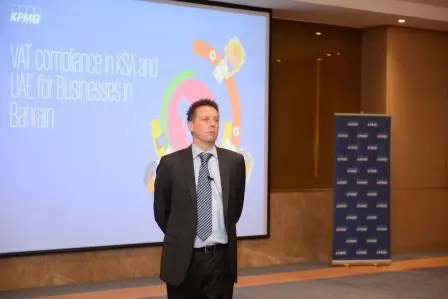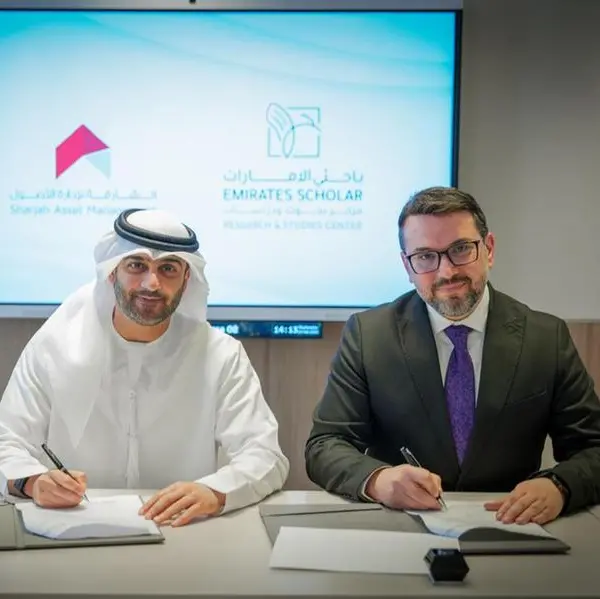PHOTO
Around 100 business leaders and senior finance executives gathered yesterday at an event organized by KPMG in Bahrain to review and debate the first 100 days of VAT in the GCC and the lessons to be learnt for Bahraini businesses from the introduction of value-added tax (VAT) in the Kingdom of Saudi Arabia (KSA) and the United Arab Emirates (UAE). The half-day seminar, ‘VAT compliance for Bahrain businesses in KSA and UAE: the do’s and don’ts in Bahrain and beyond’ examined the current implications on Bahraini businesses with operations in or with Gulf countries that have already implemented VAT, how to tackle these, how to ensure a correct tax treatment from business partners and what to expect in Bahrain including process and technology solutions.
Philippe Norré, Tax Partner and Head of Indirect Taxes at KPMG in Bahrain explained in that having a clear understanding of VAT treatment for outgoing and incoming transactions between countries that have implemented VAT and those yet to implement VAT (like Bahrain), is just one of the current main challenges facing companies in non-implementing GCC states. Receiving mass-mailing from vendors and clients asking for VAT information before entering into a transaction, incurring undue KSA or UAE VAT and seeing invoices remaining unpaid are just a few of the commercial issues faced across the GCC. From what is seen in the UAE and KSA, is proven essential for businesses to have the correct technology and automation framework in place to account for the VAT accounting and to compile and report VAT returns to the competent tax authority in a timely manner. He added; “Adhering to compliance formalities from purchase order over invoicing to booking and proper inward processing of procurement invoices is critical, as failure to do so can impact cash-flow, lead to stress within the business and possibly result in financial penalties.”
“Although VAT is not intended to be a tax incumbent on businesses, proper compliance and self-audit and assessment by tax-payers is an important cornerstone for the administration of the VAT by the Tax Authority (in the course of being set up in Bahrain) and this implies for companies the need to plan for automation of their VAT processes to minimize errors and be ready for an increased digitalization on the authorities’ side through real-life reporting and master data uploads and analytics. Initial steps to take can be upgrading or automating from within the existing Enterprise Resource Planning (ERP) system or rolling out add-on tools, embedded in the overall digital strategy of the organization. VAT is a new concept to Bahrain and the GCC region, and after go-live further changes are quickly expected to happen to the law and its application. Therefore, companies need to be responsive to regulatory updates and take action to adapt their internal processes, knowledge management and IT systems.” Norré continued.
During the event, Norré explained as well how to prepare tax returns, with lessons derived from the first compliance cycle in KSA and UAE and showcased digital options available in the market to optimize this process. He also reviewed the role of tax agents in streamlining tax reporting and compliance and discussed the expected approach in the Kingdom of Bahrain.
The event took place on Monday 12 March 2018 at the Downtown Rotana Hotel. For more information about KPMG in Bahrain’s upcoming tax events, please contact Khalid Seyadi, senior marketing executive at KPMG in Bahrain, on kseyadi@kpmg.com.
KPMG in Bahrain is a member firm of KPMG International. The firm was established in 1968 as the first national accounting and auditing firm, and it has grown to be one of the largest professional services firms in the country. The firm provides Audit, Tax and Advisory services to a wide array of clients operating in different sectors, utilizing the in-depth technical and industry experience of its professional staff.
-Ends-
About KPMG
KPMG is a global network of professional services firms providing Audit, Advisory and Tax services. We operate in 154 countries and territories and have 200,000 people working in member firms around the world. The independent member firms of the KPMG network are affiliated with KPMG International Cooperative (KPMG International), a Swiss entity. Each KPMG firm is a legally distinct and separate entity and describes itself as such.
For more information, please contact:
Afrah Faraj
Marketing and communications manager
KPMG in Bahrain
© Press Release 2018


















